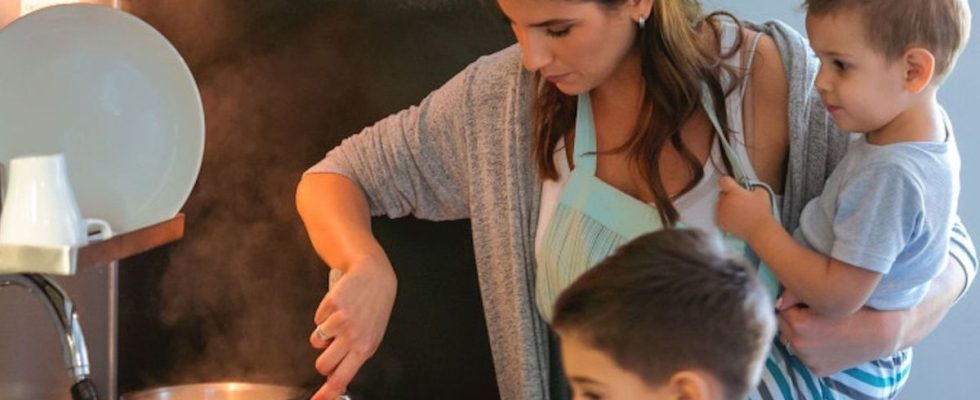Published on
Updated
Reading 3 min.
They have children and are married, and yet they give the impression of being single mothers. On social media, they are called “single married moms”. This oxymoron exposes the difficulties of these women who have to deal with spouses who are not very active in the household or the education of their children.
The video that perfectly illustrates this trend is that of Hannah, aka healing_sadiee on TikTok. In this sequence, viewed almost 5 million times, this married woman and mother of a young son, discovers the state of her house, after having isolated herself for a week upstairs with her child because they had caught the Covid, leaving the ground floor to her husband. His video focuses on his messy kitchen, the sink overflowing with dirty dishes, bags and boxes scattered on the table and work surface. “The whole kitchen smells like vinegar, which means there’s rotten food hidden somewhere,” she says.
Hannah, followed by nearly 25,000 subscribers, regularly documents on TikTok her efforts to maintain a family home while facing challenges. mental health problems. But this video quickly sparked widespread outrage in the comments, pointing out the fact that her husband did not clean while she was ill. “You deserve better,” write several socionauts. Some even go so far as to advise him to divorce. Others refer to Hannah as a “Single married mom.” This expression refers to married women who shoulder a large part of the domestic and parental tasks, as if they were single and without a partner to help them. And Hannah would not be an isolated case.
A simple search for the terms #Singlemarriedmom or #Singlemarriedmomlife on TikTok reveals a multitude of videos in which women take care of the household or children in the face of passive husbands and fathers. Like this video in which we see a mother feeding her three children at arm’s length in a restaurant while her partner eats without being disturbed. In another video, a woman, who is already carrying two large bags on her shoulders, falls backwards while taking her child out of the car, while her husband is carrying nothing. Although these situations are now exposed on social networks, this inequality of roles is far from recent.
A phenomenon far from new
Although these situations are now exposed on social networks, this inequality of roles is far from recent. “This is a similar phenomenon to the discussion of ‘mental load‘, according to which planning and organizing relationships are the woman’s responsibility, as are household tasks such as laundry, cooking, cleaning and meal preparation“, explains Carly Dober, a psychologist based in Melbourne, in an article from news.com.au.
According to the expert, these domestic tasks are often considered “women’s work”. In France, two thirds of women say they take care of all the household chores – and 70% of women aged 35 to 65 – compared to 39% of men, according to a survey*. Even if they advocate equal sharing, men are considered more as help in the household.
“However, many women saw what the unequal partnership did to other women in their lives, such as their mothers and grandmothers, and how it negatively contributed to their health, well-being and their misfortune. This is why we are talking about it more than ever and why new names have appeared to denounce these tiring stereotypes.she adds.
Compared to previous generations, more and more women are working and don’t have time to take care of everything. “More women have entered the workforce and are also trying to navigate raising children, running a household, and finding time for their health and wellness, which is an exercise incredibly difficult juggling“, explains Carly Dober. “This is why women notice more if they don’t get help and advocate for change“.
*Barometer conducted for Briochin by the French institute Poll&Roll, from January 4 to 8, 2024, among 800 people aged 18 and over.

